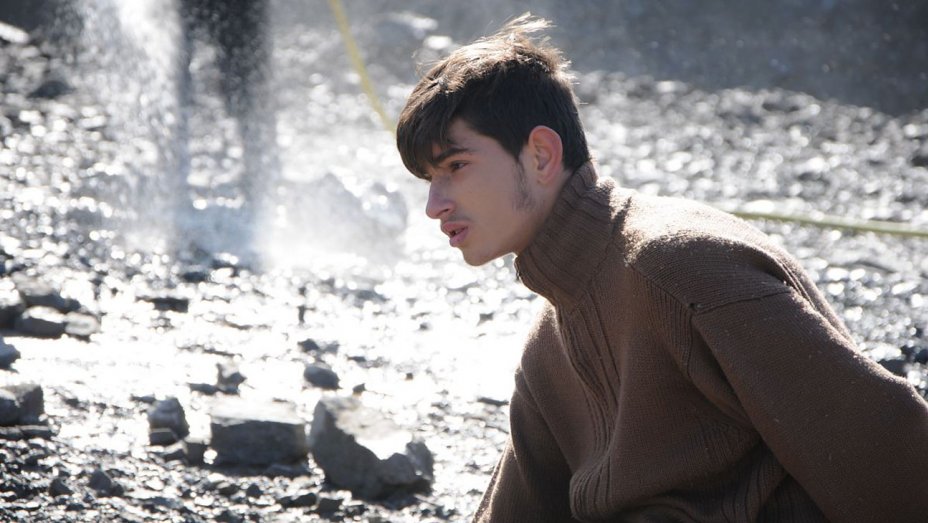Albania’s submission for the foreign-language film Oscar charts a rural teenager’s rite of passage.
At the core of Chromium is rock — from the metallic ore with which its young protagonist hopes to find his worth to the banging music that opens the country boy’s eyes about the world outside his rural hometown. The film itself is as compact and solid as a rock, too. Four years after making his debut with the remarkable Amnesty — a relationship drama about the bond between two long-suffering spouses of jailed convicts — Albanian director Bujar Alimani follows up with a work of lustrous imagery and magnetic performances that could have been merely a simple, well-trodden rite-of-passage narrative.
Revolving around a teenager’s growing pains — from observing his single mother’s blooming relationship with another man to his own uncertain feelings toward his rebellious teacher — Chromium offers universal drama seasoned with subtle local characteristics. To his credit, Alimani doesn’t simply parade the easy cultural clichés of, say, rifle-wielding, blood-feuding clansmen or worn icons of Albania’s communist legacy. Just like in Amnesty, Chromium charts a young generation’s struggle to grow up in a country on the cusp of social change.
At the center of Amnesty is a young mother trying to raise her two children on her own while her husband is away. Here, Chromium‘s single-parent family scenario unfolds from the point of view of the children. Adi (Fredjon Kuci) lives with his mother (Klodjana Keco) and his young brother (Denis Shira) in a village a long way away from the town where his school is. He doesn’t have a cellphone or a computer, and is frequently bullied for not having a father around. His frustration builds as he witnesses his mother — a mute herbalist who earns a meager living with her homemade foodstuff — becoming intimate with a man (Kasem Hoxha) who regularly comes over to help repair the home.
As most onscreen fatherless boys do, Adi rejects the man as an usurper, however well-meaning and kind he appears to be. In a juvenile act of one-upmanship, Adi takes up work at a local chromite mine with the hope of staking his claim as the breadwinner in the house. Adi learns how to react positively to his new reality through his interactions with his leather-wearing, rock-loving math teacher (Mirela Naska), a maternal mentor who shows him how to strike a balance between youthful resistance and reconciliation through the way she battles her own problems.
Shot on widescreen by Greek cinematographer Ilias Adamis (who also worked on Amnesty), the film benefits from a screenplay that’s delicate and restrained in its exposition of the personalities and relationships onscreen; in place of confessional conversations or verbose rows, Alimani has his characters vent their guilt, desire and pent-up fury through a frown, a silent glance or — in one of the film’s most dynamic scenes — a cathartic chopping of wood.
The cast rises to the occasion, with Kuci delivering a revelatory turn. With its slow-burning drama and sturdy performances, Chromium offers a remarkable snapshot of how small-town teenage angst manifests itself in the provincial fringes of Albania.
Cast: Fredjon Kuci, Klodjana Keco, Mirela Naska, Kasem Hoxha, Denis Shira
Director-screenwriter: Bujar Alimani
Producers: Tefta Bejko, Anita Elsani, Valon Jaupaj, Thanos Anastopoulos, Stella Theodorakis
Director of photography: Ilias Adamis
Art director: Emir Turkeshi-Gramo
Costume designer: Stela Laknori
Editor: Bonita Papastathi
Music: Pjeter Gaci
International sales: 90 Production
Director-screenwriter: Bujar Alimani
Producers: Tefta Bejko, Anita Elsani, Valon Jaupaj, Thanos Anastopoulos, Stella Theodorakis
Director of photography: Ilias Adamis
Art director: Emir Turkeshi-Gramo
Costume designer: Stela Laknori
Editor: Bonita Papastathi
Music: Pjeter Gaci
International sales: 90 Production
In Albanian
Not rated, 75 minutes
http://www.hollywoodreporter.com/review/chromium-krom-933317

